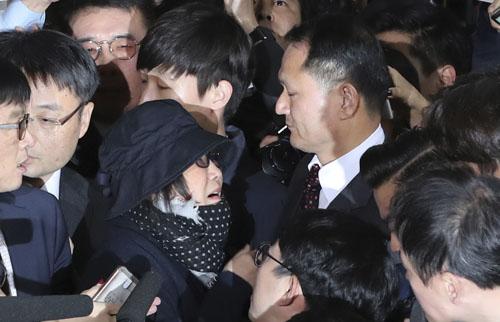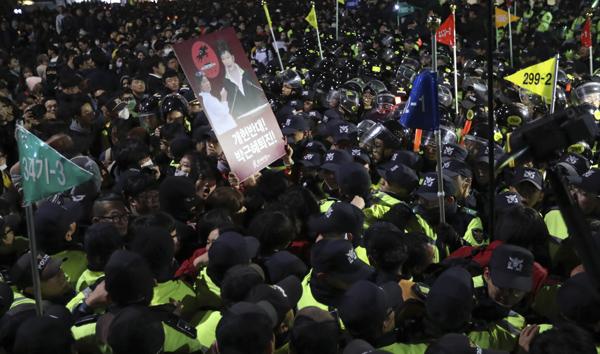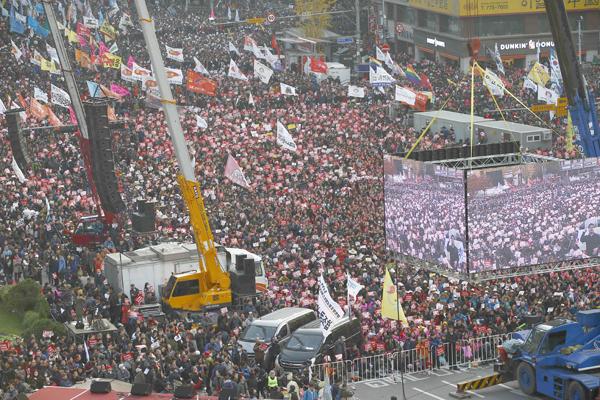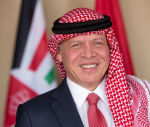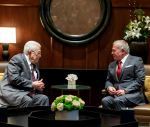You are here
The downfall of S. Korea’s ‘Queen of Elections’
By AFP - Nov 22,2016 - Last updated at Nov 22,2016
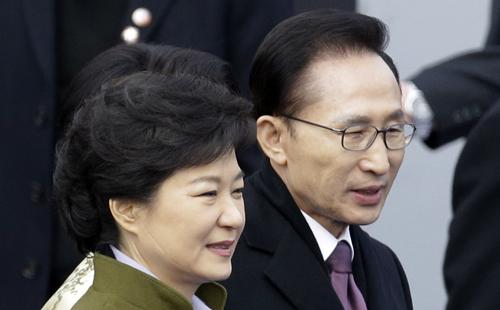
In this February 25, 2013 photo, South Korea's President Park Geun-hye (left) walks with outgoing president Lee Myung-bak, after her inauguration ceremony as the 18th South Korean president at the National Assembly in Seoul (AP photo)
SEOUL — Elected on a "no-corruption" ticket, South Korean President Park Geun-hye now looks set to become the country's first sitting president to be formally questioned as a suspect in a criminal investigation.
It is a stunning fall from grace for a politician who had run as an incorruptible candidate, declaring herself beholden to nobody and "married to the nation".
High-level corruption has long been a stain on South Korea's democratic credentials and the presidential Blue House is no stranger to allegations of cronyism.
Since South Korea's first free and fair election in 1987, every president has faced graft investigations after leaving office and one — Roh Moo-hyun — committed suicide as a corruption probe closed in on his family.
Their cases often involved family members who were able to leverage links to the president in a society where political influence has traditionally had a very close and unhealthy rapport with business success.
Park, the daughter of military strongman Park Chung-hee who led the country from 1961 to 1979, was meant to be different.
Both her parents were assassinated and, estranged from her two siblings, unmarried and childless, she promoted herself as invulnerable to nepotism.
"I have no family to look after nor children to inherit my property... I want to devote myself to the nation and the people," she said in a speech during the 2012 presidential campaign.
The image of duty and self-sacrifice played well with the conservative base of her ruling Saenuri Party, especially older voters who saw her as a virtuous survivor of personal tragedy.
'Queen of Elections'
As chairwoman between 2004 and 2006, Park was credited with turning around the party's political fortunes, winning a number of key polls and earning her the nickname "Queen of Elections".
As president, she continued to cultivate the persona of the nation's "selfless daughter" — a private person who normally dined alone and spent what little free time she had in the company of her dogs.
All the more shocking then were the revelations of the extraordinary influence wielded over the president by her long-time friend and confidante Choi Soon-sil — now indicted on charges of coercion and abuse of power.
Prosecutors on Sunday said Park had played a "collusive role" in Choi's criminal activities, which included coercing conglomerates into donating tens of millions of dollars to non-profit foundations, allegedly for Choi's personal gain.
Park also faces allegations that she leaked confidential documents to Choi, who holds no official position, and sought her advice on matters of state, including key appointments.
The scandal has seen Park's approval ratings plunge to record lows, as hundreds of thousands of protesters have taken to the streets in a series of weekly protests to demand that she resign.
"It isn't just about corruption. People genuinely think they have been deceived by Park Geun-hye," said Kim Jong-yup, a sociology professor at Hanshin University.
"They thought she had inherited all the good qualities of her parents — the initiative and drive for economic development of her father and the caring and feminine character of her mother.
"They thought she was Park Chung-hee without dictatorship. But now the fantasy has been broken and they realise they have been wrong," Kim said.
The 'lonely' president
In a televised apology earlier this month, Park spoke of her "lonely" life as president, and acknowledged she had been "careless" and over-trusting in her relationship with Choi.
Under South Korea's constitution, a sitting president cannot be charged with a criminal offence except insurrection or treason. But she can be investigated by prosecutors and possibly charged after leaving office.
"My own sense is that this is a friendship run badly amok," said Robert Kelly, a professor of political science at Busan National University.
"It sounds a lot like she was lonely and lost sight of proper boundaries.
"Choi's influence was likely inappropriate and unethical, but it is not obviously criminal. Barring some bombshell revelation, I doubt Park Geun-hye will step down," Kelly said.
More than 50 companies, including giants like Samsung and Hyundai, were allegedly forced to donate a total of 77.4 billion won ($65.5 million) to the two foundations controlled by Choi.
According to prosecutors, many acted out of fear of reprisals, like harsh tax audits or delays in getting regulatory approvals.
"Although Park kept her distance from her family and relatives, her unconditional trust in Choi led her to believe that the country would benefit from these foundations," said Han Hee-won, a law professor at Dongguk University.
"This is a political scandal rather than corruption. There is no proof yet that Park took the millions for herself," Han said.
Related Articles
SEOUL — The woman at the centre of a South Korean political scandal begged forgiveness on Monday as she arrived to meet prosecutors investig
SEOUL — Thousands of South Koreans took to the streets of the capital on Saturday calling for increasingly unpopular President Park Geun-hye
SEOUL — South Korean President Park Geun-hye faced mounting pressure to step down on Saturday as hundreds of thousands of demonstrators marc


